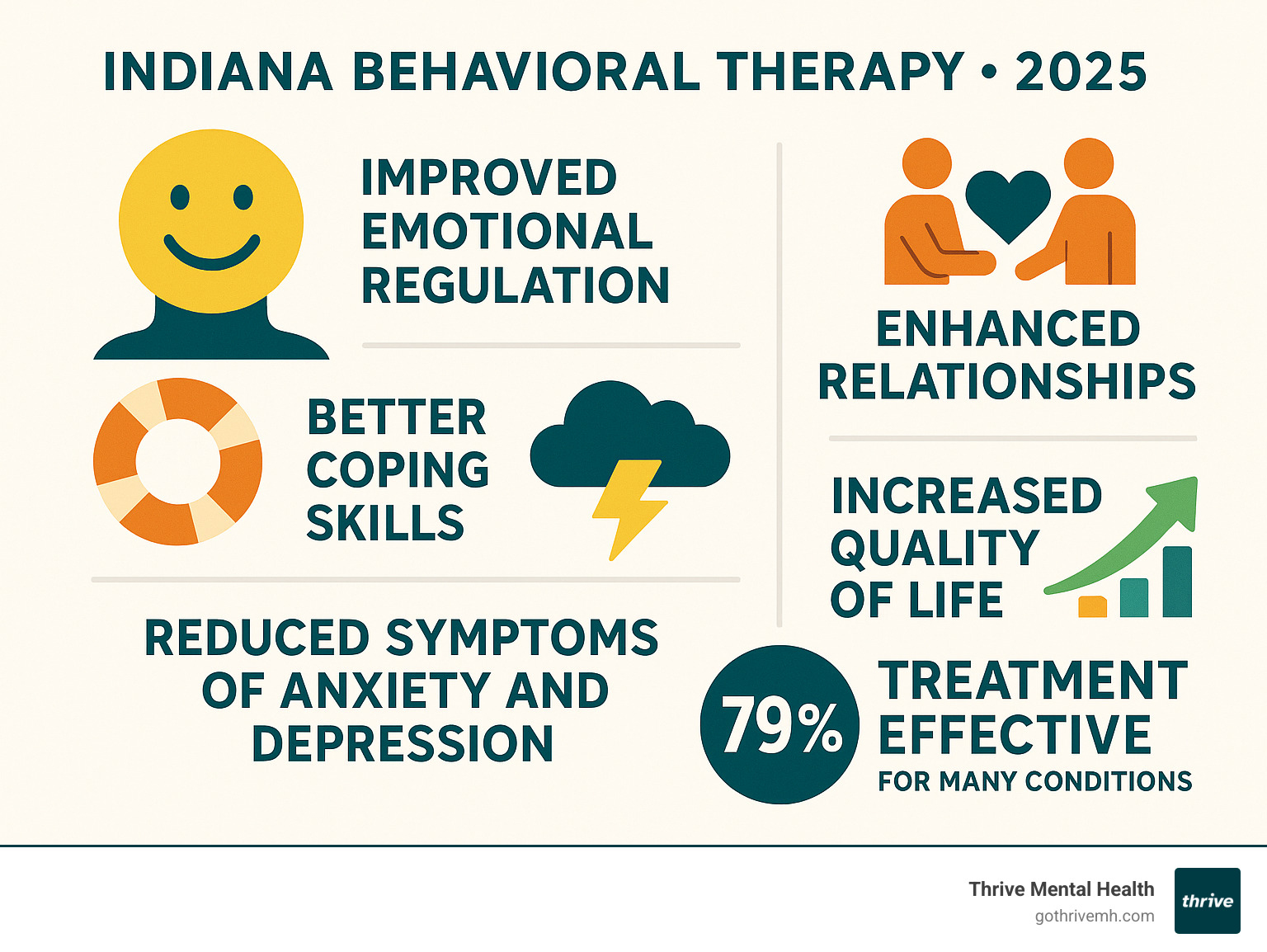Unlock Your Potential with Behavioral Therapy in Indiana

Why Mental Health Support Matters in Florida
Florida behavioral therapy offers evidence-based treatment for mental health challenges that affect nearly 1 in 4 people each year. If you’re seeking behavioral therapy services in Florida, here are your main options:
Top Behavioral Therapy Types Available:
- Cognitive Behavioral Therapy (CBT) – Changes negative thought patterns
- Dialectical Behavior Therapy (DBT) – Builds emotional regulation skills
- Applied Behavior Analysis (ABA) – Addresses autism and developmental needs
- EMDR Therapy – Processes trauma and PTSD
- Virtual/Online Therapy – Flexible, accessible care from home
Where to Find Services:
- Licensed therapists (LCSW, LMHC, BCBA credentials)
- Intensive Outpatient Programs (IOP)
- Partial Hospitalization Programs (PHP)
- Community health centers
- Virtual therapy platforms
Mental health problems represent the largest source of economic health burden globally, with costs projected to exceed $6 trillion by 2030. Yet only about 25% of people with mental health conditions receive ongoing treatment.
The good news? Florida offers comprehensive behavioral therapy services through qualified professionals, from traditional in-person sessions to innovative virtual programs. Whether you’re dealing with anxiety, depression, trauma, or other challenges, effective help is available.
Getting the right support can transform your daily life, relationships, and overall well-being. This guide walks you through everything you need to know about accessing quality behavioral therapy in Florida.
I’m Nate Raine, CEO of Thrive Mental Health, where we’ve helped thousands access flexible, expert-led Florida behavioral therapy through our virtual intensive outpatient programs. My experience leading behavioral health innovation has shown me how the right treatment approach can open up potential and create lasting change.

Florida behavioral therapy basics:
Understanding Behavioral Therapy in Florida: Types and Conditions Treated
Think of behavioral therapy as your personal toolkit for creating positive change. At its heart, Florida behavioral therapy focuses on a simple but powerful idea: the behaviors and thought patterns that aren’t serving you well can be learned in new, healthier ways.

What makes behavioral therapy so effective is that it’s grounded in solid research and real-world results. Rather than just talking about problems, these approaches give you concrete skills and strategies you can use right away.
At Thrive Mental Health, we’ve built our programs around evidence-based therapies that actually work. Our virtual and in-person intensive outpatient programs bring together several powerful approaches, each designed to meet you exactly where you are.
Cognitive Behavioral Therapy (CBT) is like having a friendly detective help you solve the mystery of your thoughts and feelings. When you’re stuck in cycles of anxiety or depression, CBT helps you spot the connections between what you’re thinking, how you’re feeling, and what you’re doing. Our CBT at Thrive Mental Health programs teach you how to challenge those unhelpful thoughts and replace them with more balanced, realistic ones.
Dialectical Behavior Therapy (DBT) takes things a step further, especially if you find yourself struggling with intense emotions that feel overwhelming. Originally developed for people with borderline personality disorder, DBT has proven incredibly helpful for anyone who needs stronger emotional regulation skills. Through our DBT virtual IOP programs, you’ll learn four core skills: staying present through mindfulness, tolerating distress without making it worse, managing emotions effectively, and communicating in relationships.
For those carrying the weight of trauma, Eye Movement Desensitization and Reprocessing (EMDR) offers a unique path to healing. EMDR helps your brain process difficult memories in a way that reduces their emotional charge. It might sound unusual – following lights or sounds while recalling traumatic events – but the results speak for themselves. Our EMDR Therapy at Thrive helps people move from being stuck in the past to feeling more free in the present.
Sometimes words aren’t enough, and that’s where Art Therapy comes in. Whether you consider yourself artistic or not, creative expression can open up feelings and insights that traditional talk therapy might miss. Through our Art Therapy at Thrive sessions, you’ll find how painting, drawing, or other creative activities can become powerful tools for healing and self-findy.
These therapies work so well because they meet people where they are and give them practical tools they can use every day. Our comprehensive guide to behavioral health services shows how these different approaches can work together to create lasting change.
Common Conditions Addressed by Behavioral Therapy
The beauty of behavioral therapy is its versatility. Whether you’re dealing with something that’s been bothering you for years or facing a recent challenge, these approaches can help. With nearly 1 in 4 people experiencing a behavioral health condition each year, you’re definitely not alone in needing support.
Anxiety disorders are among the most common reasons people seek behavioral therapy. Whether it’s the constant worry of generalized anxiety, the sudden panic attacks, or the fear of social situations, CBT and other behavioral approaches give you concrete ways to manage anxious thoughts and gradually face your fears safely.
Depression can make even simple daily tasks feel impossible. Behavioral therapy helps by teaching you how to challenge negative thought patterns, engage in activities that lift your mood, and build routines that support your mental health. It’s not about forcing positivity – it’s about finding realistic ways to feel more like yourself again.
For those dealing with PTSD, the right therapy can be life-changing. EMDR and trauma-informed approaches help process difficult experiences so they don’t continue to control your daily life. Many people find that symptoms like flashbacks, nightmares, and constant alertness begin to fade as they work through their trauma safely.
Bipolar disorder requires a thoughtful approach that combines behavioral strategies with other treatments. Therapy helps you recognize mood patterns, develop coping strategies for both manic and depressive episodes, and maintain stability in your daily life.
Substance use disorders respond well to behavioral interventions that help you identify triggers, build new coping skills, and create a lifestyle that supports recovery. The goal isn’t just stopping substance use – it’s building a life you don’t want to escape from.
Obsessive-Compulsive Disorder (OCD) can feel like being trapped by your own thoughts and behaviors. Specialized techniques like Exposure and Response Prevention help you gradually break free from compulsive patterns while learning to tolerate uncertainty.
Beyond these specific conditions, behavioral therapy helps with everyday challenges like stress management, relationship difficulties, grief, and major life transitions. Resources like Mental Health America offer additional information about various mental health conditions and available support.
The Rise of Virtual Therapy Options
One of the most exciting developments in Florida behavioral therapy has been the growth of virtual care options. What started as a necessity during the pandemic has become a preferred choice for many people who finded the benefits of receiving therapy from home.
Convenience and accessibility are game-changers when you’re trying to prioritize your mental health. Instead of rushing through traffic to make an appointment, you can log in from your living room, office, or anywhere you feel comfortable. This is especially valuable if you live in a rural area where mental health services might be limited, or if you have a busy schedule that makes traditional appointments challenging.
Overcoming transportation barriers has opened up therapy to people who previously couldn’t access it consistently. Whether you don’t have reliable transportation, struggle with mobility issues, or juggle multiple responsibilities like work and childcare, virtual therapy removes these obstacles. You can attend sessions during your lunch break, after the kids go to bed, or whenever works best for your life.
The flexibility of virtual care means you can maintain consistency in your treatment, which is crucial for making progress. Our online therapy and telehealth therapy programs are designed to provide the same quality of care you’d receive in person, with the added benefit of fitting into your real life.
When choosing a virtual provider, look for licensed professionals who specialize in the type of therapy you need and have experience with online delivery. The technology should be secure and user-friendly, and you should feel just as connected to your therapist as you would in person. The right virtual therapy experience can be just as powerful as traditional face-to-face sessions, sometimes even more so because you’re in your own comfortable environment.
A Closer Look at Applied Behavior Analysis (ABA) in Florida

Applied Behavior Analysis represents one of the most structured and research-backed approaches within Florida behavioral therapy. If you’ve heard of ABA, you might know it’s especially effective for autism support, but its applications extend much further than many people realize.
At its heart, ABA therapy focuses on understanding how behavior works in real-world settings. Think of it as detective work – therapists carefully observe patterns, collect data, and create individualized plans to increase helpful behaviors while reducing those that interfere with learning or daily life.
The approach uses principles of learning and motivation that have been tested and refined over decades. What makes ABA unique is its systematic nature – every intervention is measured, adjusted, and custom to the individual’s specific needs and goals.
Autism Spectrum Disorder remains the most common reason families seek ABA services. For children and teens on the spectrum, ABA can be transformative in developing communication skills, social interactions, and daily living abilities that support greater independence.
But ABA also benefits individuals with other developmental disabilities where behavioral challenges impact their ability to function, learn, or engage with their community. The key is that the therapy must be medically necessary and designed around the person’s unique strengths and challenges.
At Thrive Mental Health, we understand how important comprehensive behavioral support can be for families. While our expertise centers on intensive outpatient and partial hospitalization programs for mental health, we recognize that some individuals benefit from the specialized structure that ABA provides. Our approach to ABA Therapy at Thrive Mental Health aligns with evidence-based practice and the individualized care philosophy that drives all effective behavioral interventions.
Navigating Regulations for Florida Behavioral Therapy: ABA Services
In Florida, state-level regulations play a crucial role in how ABA services are provided, ensuring both quality of care and appropriate access for families. These guidelines, often managed by bodies like the Florida Agency for Health Care Administration (AHCA), are designed to manage resources effectively while supporting those in need.
While specific rules can change, state regulations typically address key areas such as:
- Weekly Hour Limitations: The number of therapy hours a person can receive may be tied to their diagnosis, severity level, and a healthcare provider’s prescription.
- Service Authorizations: Most state Medicaid plans and many private insurers require prior authorization to ensure that ABA therapy is medically necessary. This may involve reviews to continue services over longer periods.
- Provider Qualifications: States set standards for who can provide ABA therapy to ensure practitioners are properly certified and trained.
These regulations are in place to ensure that ABA therapy remains a high-quality, evidence-based intervention. Because guidelines can be updated, it’s essential for families to get the most current information. We recommend consulting directly with your healthcare provider and visiting the official website for the Florida Agency for Health Care Administration (AHCA) for detailed guidance.
Navigating these regulations can feel overwhelming, especially when you’re already managing the complexities of supporting a loved one with developmental needs. We encourage families to work closely with their providers and don’t hesitate to seek clarification from relevant state agencies when questions arise.
How to Access and Afford Florida Behavioral Therapy
Finding the right support can feel overwhelming, but accessing Florida behavioral therapy is more achievable than you might think. We believe that everyone deserves the opportunity to open up their potential through effective mental health care.

Finding a Provider
The journey to better mental health starts with finding the right professional. Your primary care doctor is often your best first step – they know your medical history and can provide referrals to specialists who match your specific needs. Many primary care offices now have mental health professionals on-site, making it easier to get integrated care.
Online directories have revolutionized how we find therapists. These platforms let you filter by location, specialty, insurance, and therapy approach. You can read detailed profiles and get a feel for different therapists before making contact. It’s like having a comprehensive guide to all your options at your fingertips.
At Thrive Mental Health, we’ve designed our comprehensive behavioral health services specifically for people across Florida who need flexible, expert-led care. Our virtual intensive outpatient and partial hospitalization programs mean you can access evidence-based treatment from anywhere in the state – whether you’re in Tampa, St. Petersburg, or a small rural town.
Community mental health centers serve as crucial safety nets, often providing services on sliding-scale fees. These centers understand that quality mental health care shouldn’t depend on your income level.
University clinics offer another valuable option. These programs typically provide high-quality care at reduced costs, with services delivered by advanced graduate students under close faculty supervision.
Crisis Intervention Resources
If you or someone you know is experiencing a mental health crisis, immediate help is available. The National Suicide & Crisis Lifeline is just three digits away – call or text 988 for 24/7 support from trained counselors who understand what you’re going through.
For life-threatening emergencies, always call 911. Emergency departments across Florida have protocols specifically for mental health crises and can connect you with appropriate follow-up care.
Reaching out during a crisis isn’t a sign of weakness – it’s a sign of strength and self-awareness. These resources exist because you matter, and your life has value.
Navigating Costs and Insurance Coverage
Let’s be honest – the cost of therapy can feel daunting. But here’s the thing: there are more options to make Florida behavioral therapy affordable than most people realize.
Therapy costs typically range from $100 to $200 per hour for traditional in-person sessions. Virtual therapy platforms often offer more competitive rates, and the lack of travel time and costs can make sessions more accessible overall.
Your health insurance likely covers mental health services, thanks to parity laws that require equal coverage for mental and physical health. The key is understanding your specific benefits – things like deductibles, co-pays, and whether your chosen provider is in-network. Our guide on the benefits of health insurance covering mental health services can help you maximize your coverage.
Medicaid serves as a lifeline for many Floridians with limited income. Numerous behavioral health providers across Florida accept Medicaid, and virtual platforms are increasingly working to ensure access for Medicaid recipients. You can learn more about Medicaid covered therapy at Thrive and how we work to make our programs accessible.
Sliding-scale fees adjust the cost of services based on your income and ability to pay. Don’t hesitate to ask providers about this option – many therapists offer it because they genuinely want to help, regardless of your financial situation.
Community health centers receive funding specifically to provide affordable care to underserved populations. These centers often offer comprehensive services, including therapy, at significantly reduced costs or even free for qualifying individuals.
The bottom line? Financial barriers shouldn’t prevent you from getting the help you need. With some research and the right questions, you can find quality Florida behavioral therapy that fits your budget and your life.
Finding Qualified Professionals and Specialized Services in Florida
When you’re looking for Florida behavioral therapy, understanding professional qualifications and available specialized services helps you make the best choice for your unique situation. At Thrive Mental Health, we believe that connecting with the right qualified professional can truly transform your journey toward better mental health.

The world of mental health credentials can feel confusing at first, but knowing what different letters after someone’s name mean can help you find exactly the right fit. Licensed Clinical Social Workers (LCSWs) bring a unique perspective to therapy, focusing on how your environment and relationships impact your mental health. They’re trained to provide individual, group, and family therapy while considering the bigger picture of your life circumstances.
Licensed Mental Health Counselors (LMHCs) specialize in counseling techniques and treatment planning across a wide range of emotional and mental health challenges. These professionals have extensive training in various therapy approaches and can help with everything from anxiety and depression to relationship issues and life transitions.
For those seeking Applied Behavior Analysis services, Board Certified Behavior Analysts (BCBAs) represent the gold standard. These highly trained professionals design and oversee ABA programs, particularly for individuals with autism and developmental disabilities. They ensure that every intervention is ethical, effective, and custom to the individual’s specific needs.
It’s worth noting that while therapists and psychologists in Florida can diagnose mental health conditions, they typically cannot prescribe medication. That authority remains with psychiatrists and other medical doctors, though many people find great success with therapy alone.
Professional associations play a vital role in maintaining high standards across Florida’s behavioral health landscape. The Florida Association for Behavior Analysis (FABA) is a key organization in the state, championing effective, ethical behavioral services. FABA works to advance the field by fostering collaboration among professionals, promoting best practices, and offering continuing education to keep practitioners current with the latest developments.
Specialized Florida Behavioral Therapy for Diverse Needs
Mental health needs are as unique as the individuals seeking help, which is why specialized services matter so much. At Thrive Mental Health, we understand that your journey is entirely your own, and our programs reflect that understanding through highly personalized care.
Young people face their own set of challenges that require specialized attention. Adolescent behavioral health issues often show up as problems at home or school, making early intervention crucial. While our primary focus centers on adults and young professionals, we recognize how important adolescent care can be. Our Adolescent Intensive Outpatient Program provides comprehensive support for young individuals navigating anxiety, depression, behavioral challenges, and the complex social and emotional landscape of growing up.
Adult mental health services address the unique pressures of adult life – career stress, relationship challenges, parenting difficulties, and managing ongoing mental health conditions. Our virtual intensive outpatient (IOP) and partial hospitalization (PHP) programs are specifically designed with adults and young professionals in mind. Our Adult Outpatient Mental Health services offer flexible, evidence-based treatment that fits into your busy life while addressing depression, anxiety, trauma, and substance use concerns.
Support for individuals with developmental disabilities requires specialized expertise and approaches. Organizations throughout Florida provide dedicated behavior management programs, recreational therapy, and music therapy – all aimed at improving quality of life and fostering greater independence. While our direct services focus on intensive outpatient care, we believe in connecting people with the right resources throughout Florida’s comprehensive network of providers.
Beyond age-specific services, Florida behavioral therapy can be custom for specific populations and needs. Whether someone is dealing with eating disorders, grief and loss, chronic pain, or other specialized concerns, there are qualified professionals ready to help. Resources like NAMI Florida provide invaluable support for individuals and families affected by mental illness, offering education, advocacy, and the powerful connection of peer support.
Our commitment at Thrive Mental Health centers on providing personalized, whole-person care that supports long-term healing and success. We ensure immediate access and flexible scheduling because we know that when you’re ready to take that step toward better mental health, you shouldn’t have to wait.
Conclusion: Your Path to Wellness with Florida Behavioral Therapy
Your journey toward better mental health through Florida behavioral therapy doesn’t have to feel overwhelming or impossible. Throughout this guide, we’ve walked through the many paths available to you—from the proven effectiveness of CBT and DBT to the specialized support of EMDR and ABA therapy. Each approach offers unique tools for addressing everything from anxiety and depression to trauma and developmental challenges.
The mental health landscape has truly transformed with virtual therapy options. What once required long drives and rigid scheduling now fits into your life wherever you are in Florida. You can access expert-led care from your living room, during a lunch break, or whenever works best for your unique situation.
We’ve also tackled the practical stuff that often keeps people from getting help—understanding insurance coverage, finding qualified professionals with the right credentials, and navigating costs. These barriers are real, but they’re not impossible when you know where to look and what questions to ask.
Here’s what I want you to remember: seeking help is one of the bravest things you can do. It’s not about admitting defeat—it’s about choosing growth, healing, and a better quality of life. Every person who has found their way through therapy started exactly where you are now, wondering if it would really make a difference.
At Thrive Mental Health, we’ve built our entire approach around making that choice easier. Our virtual intensive outpatient and partial hospitalization programs are designed for busy adults and young professionals who need real support without turning their lives upside down. We focus on flexible, expert-led, evidence-based care that actually fits into your world, not the other way around.
Whether you’re dealing with anxiety that’s been holding you back, depression that feels too heavy to carry alone, or trauma that’s affecting every aspect of your life, there’s hope. The tools and support you need are available, and the professionals who can guide you are ready to help.
Your path to wellness starts with that first conversation, that first appointment, that first moment of saying “I’m ready to feel better.” We’re here to walk alongside you every step of the way. For more guidance on taking that next step, explore our comprehensive resource on navigating local therapy options for better mental health.
The life you want—one where you feel more in control, more connected, and more like yourself—is absolutely within reach.